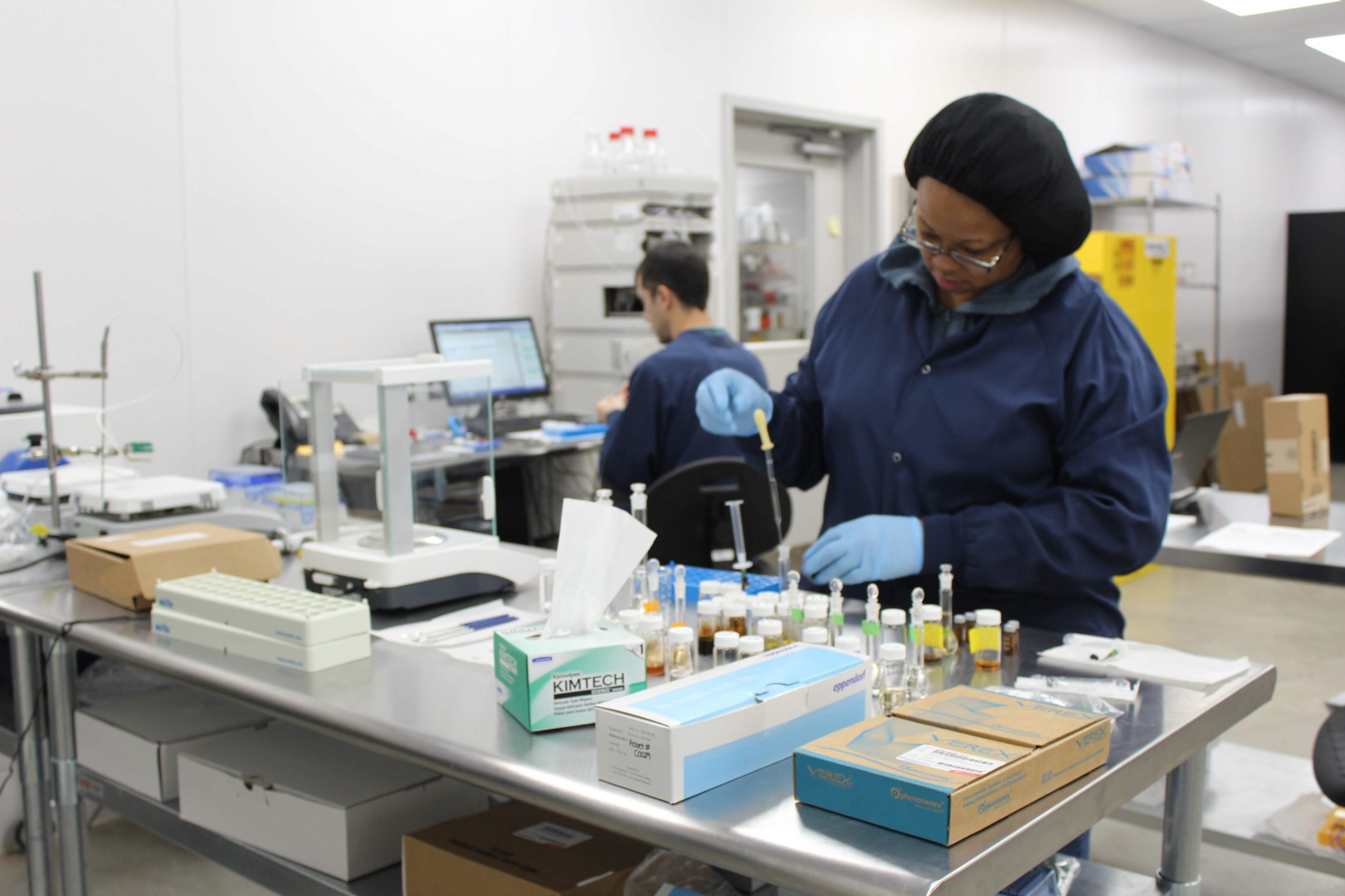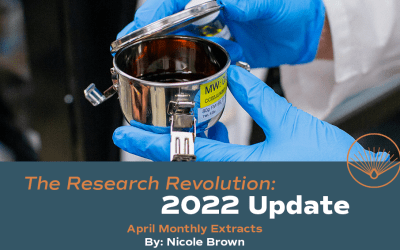Author: Dave Neundorfer
June 2, 2021 – 8 min read
Today, we are living in a world shaped by this game-changing, plant-based medicinal treatment that regulates critical bodily functions and supports disease prevention. Embraced across the globe and across user demographics, these products are synonymous with good health and are ubiquitous in the ingredient, food and beverage enhancement and dietary supplement markets.
They were discovered in 1911 by a biochemist named Casimir Funk. He called his discovery “vital amines” which, over time, was contracted to “vitamins.”
The path from discovery to mainstream adoption of vitamins is a great analog for our cannabinoid journey.
For both vitamins and cannabinoids, human trial-and-error preceded scientific discovery—sailors ate lemon and limes on long voyages to prevent scurvy in the mid-1700’s, and the first recorded medical use of cannabis to treat pain was in China in 2,700 B.C.(1)
At the outset, the health and wellness claims of both vitamins and cannabinoids were met with skepticism—the decades following Dr. Funk’s discovery was marked by doubt and confusion as the scientific exploration progressed, a phase in the cannabinoid journey that I’d argue we are currently navigating (at least with the mainstream consumer).
In the decades following discovery, the scope of applications for and therapeutic benefits of vitamins and cannabinoids was in constant flux–Funk’s original discovery, later to be known as Vitamin B, was postulated as a single substance to treat a single disease–beriberi–before exploding into a class of nutrients indispensable to human health, whereas the application and therapeutic benefit sets of cannabinoids continues to expand as scientists discover and characterize new cannabinoids and receptors along with the ailments and disorders they address.
As we at OBX design our cannabinoid research and product development strategies, the evolution of vitamins from medical discovery to a primary contributor in the $140.3B dietary supplement industry(2) is especially enlightening.
For example, in 1922, Casimir Funk launched the first commercial vitamin product called “Oscodal” which featured pure Vitamin A and D(3). Oscodal is strikingly similar to the thousands of brands that launched cannabinoid products over the last two years using a one-size-fits all approach with a single hero ingredient–CBD–in basic tincture or cream formulations. It’s CBD, use it for everything!
Today, multivitamin products give the consumer options that allow for personal customization and health optimization.
For example, go to Nature’s Way site and see the product filter column across the left side, which gives the consumer options on form--gummy, chewable, liquid, softgel, tablet–dietary needs–dairy free, gluten free–demographics–age, gender and life stage–and health goals–energy, hair skin nails, general wellness, prenatal, ultra potency–which direct the customer to the products that address their specific needs.

Cannabinoids are early on the journey from a one-cannabinoid-fits-all market to personalization and optimization with sophisticated form factors with elegant formulations that focus on a specific need state for a specific consumer.
There’s still a lot of work yet to be done. Most of the CBD in this market is still delivered in gummy or tincture form in bottles that look more like Oscodal than Alive!, so it’s no surprise that despite all of the buzz about CBD, consumer awareness in the US is at 80% whereas consumer trial hovers at around 15%. The movement to personalized and function-specific products is underway–many of the “one-size-fits-all” brands have languished and the new leaders of the categories are finding success by focusing on a target demographic, need state, and differentiated forms.
OBX is proud to serve and support these forward-thinking brands and accelerate the points of differentiation and the science that is needed to overcome the adoption headwinds. While these headwinds raise the bar for scientific rigor, the tailwinds–the interconnectedness of the global research community, the scientific advancements in biochemical and mechanistic analysis, and the overwhelming anecdotal evidence coming from CBD as well as medical and recreational cannabis markets across the globe–accelerate the opportunity for a broadscale movement.
Here’s how we’re advancing from the one-cannabinoid-fits-all stage of this market.
The time is now. To support the research and development needed on the ingredient and formulation front, we just completed an $11.5M capital raise to accelerate safety, efficacy, and application research.
Safety Research: Safety is the foundation for this market. There is a growing body of safety and toxicity research to which we are contributing:
- Validcare (US): OBX is pleased to participate in Validcare’s large-scale human safety study that will provide the FDA with much-needed CBD safety data. The study is designed to respond to the FDA’s repeated requests, including the Agency’s March 5, 2020 report to Congress, for science-based data to inform regulations for hemp-derived CBD products. This study will assess how long-term full- and broad-spectrum CBD use impacts liver safety, drowsiness, and testosterone levels, with results expected later this year.
- European Industrial Hemp Association (UK and Europe): OBX joined the European Industrial Hemp Association’s (EIHA) Novel Food Consortium to support the safety studies for hemp foods and extracts in the UK and European Union member states. Together with EIHA and other consortium members, we are creating safe and ready access to cannabinoid-based products throughout the UK and EU.
Efficacy Research: Consumers want products that work. The market is graduating from it’s one-size-fits-all approach to cannabinoids and is demanding function-specific therapeutics that focus on anxiety, pain, sleep, women’s health, and skin conditions. As a company, OBX has made it to “base camp” with the broadest portfolio of pure, cGMP-certified cannabinoid products, and we’ve begun our summit push to need-state focused, R&D backed, proprietary formulations.
- Pain: We are kicking off what we believe is the largest ever minor cannabinoid study with our partners at Radicle Science. The first phase is a multi-arm in-house-user-test (IHUT) with 1,500 participants per arm who will provide survey data on which of our five formulations are most effective in treating joint pain. The second phase will be placebo-controlled, double-blind, IRB approved clinicals. These studies will be the first of many that we conduct with Radicle, who’s disruptive virtual, direct-to-consumer model enables speed, scale and reach relative to traditional clinical studies.
- Skincare: We are finalizing the design of our first topical clinical trial which will test the effectiveness of minor-cannabinoid formulations on acne, rosacea, and psoriasis.
Enhancement Research: We are building a toolset that can translate in vitro study success into real-world applications by modifying cannabinoids at the molecular level or combining cannabinoids with other active or inactive compounds to enhance potency, bioavailability, and stability, and enabling targeted delivery and controlled release.
-
Stability: We have synthesized a collection of prodrugs that enhance the stability of cannabinoids over time and across substrates, and have also shown that the prodrug moiety cleaves from the compound to deliver the full payload in plasma tests. We are excited to build on these early studies in hopes of delivering enhanced cannabinoids with guaranteed stability and consistency for pharmaceutical applications.
- Controlled release: Building on the stability data, we are pursuing enhancements to enable the controlled release of cannabinoids. By selecting various enhancement moieties, we can determine the rate at which the cannabinoid is absorbed into the bloodstream. This capability will enable “12- and 24- hour” therapeutic benefits often seen in pharmaceutical drugs.
Exploratory Research: Can cannabinoids help treat depression, Alzeimers, cancer, or metabolic disorders? University researchers with labs and teams focused on specific diseases are excited to find out, and we at OBX are excited to arm them with a cannabinoid care package for early in vitro testing and analysis. There is a growing group of researchers across the globe that are excited to test cannabinoids against their fields’ most challenging problems but have had challenges gaining reliable access to consistent, pure, cannabinoid inputs. OBX is excited to remove this blocker to unlock the exploratory and applied research that has been limited due to input scarcity and compliance concerns.
Concluding Thoughts:
It gives me goosebumps to talk to researchers and chemists the world over. Many communicate a common theme of optimism and duty. As Dr. Dedi Meiri of the Technion Israel Institute of Technology shared at the 2019 Cowen Cannabis Conference, “we could spend the next 50 years researching the field of cannabinoids and we would only see the tip of the iceberg.” The science is catching up and, in many ways, exceeding the anecdotal evidence which have buoyed the category and the burgeoning global markets.
So, the wheels are in motion towards a recommended daily dose of cannabinoids that will be taken at the breakfast table with orange juice and corn flakes, and cannabinoid-enabled products for joint pain, stress, sleep, metabolic disorders, and women’s health.
We at OBX are doing our part to advance the research and education required to accelerate the pace of change and welcome you–researchers, labs, technologists, chemists–to join us in this movement.
References
- https://www.newswise.com/articles/the-discovery-of-the-endocannabinoid-system-centuries-in-the-making
- https://www.grandviewresearch.com/industry-analysis/dietary-supplements-market#:~:text=The%20global%20dietary%20supplements%20market%20size%20was%20estimated%20at%20USD,USD%20151.85%20billion%20in%202021.
- https://paulingblog.wordpress.com/2011/06/15/casimir-funk-and-a-century-of-vitamins/
Author: Dave Neundorfer
June 2, 2021 – 8 min read
Today, we are living in a world shaped by this game-changing, plant-based medicinal treatment that regulates critical bodily functions and supports disease prevention. Embraced across the globe and across user demographics, these products are synonymous with good health and are ubiquitous in the ingredient, food and beverage enhancement and dietary supplement markets.
They were discovered in 1911 by a biochemist named Casimir Funk. He called his discovery “vital amines” which, over time, was contracted to “vitamins.”
The path from discovery to mainstream adoption of vitamins is a great analog for our cannabinoid journey.
For both vitamins and cannabinoids, human trial-and-error preceded scientific discovery—sailors ate lemon and limes on long voyages to prevent scurvy in the mid-1700’s, and the first recorded medical use of cannabis to treat pain was in China in 2,700 B.C.(1)
At the outset, the health and wellness claims of both vitamins and cannabinoids were met with skepticism—the decades following Dr. Funk’s discovery was marked by doubt and confusion as the scientific exploration progressed, a phase in the cannabinoid journey that I’d argue we are currently navigating (at least with the mainstream consumer).
In the decades following discovery, the scope of applications for and therapeutic benefits of vitamins and cannabinoids was in constant flux–Funk’s original discovery, later to be known as Vitamin B, was postulated as a single substance to treat a single disease–beriberi–before exploding into a class of nutrients indispensable to human health, whereas the application and therapeutic benefit sets of cannabinoids continues to expand as scientists discover and characterize new cannabinoids and receptors along with the ailments and disorders they address.
As we at OBX design our cannabinoid research and product development strategies, the evolution of vitamins from medical discovery to a primary contributor in the $140.3B dietary supplement industry(2) is especially enlightening.
For example, in 1922, Casimir Funk launched the first commercial vitamin product called “Oscodal” which featured pure Vitamin A and D(3). Oscodal is strikingly similar to the thousands of brands that launched cannabinoid products over the last two years using a one-size-fits all approach with a single hero ingredient–CBD–in basic tincture or cream formulations. It’s CBD, use it for everything!
Today, multivitamin products give the consumer options that allow for personal customization and health optimization.
For example, go to Nature’s Way site and see the product filter column across the left side, which gives the consumer options on form--gummy, chewable, liquid, softgel, tablet–dietary needs–dairy free, gluten free–demographics–age, gender and life stage–and health goals–energy, hair skin nails, general wellness, prenatal, ultra potency–which direct the customer to the products that address their specific needs.

Cannabinoids are early on the journey from a one-cannabinoid-fits-all market to personalization and optimization with sophisticated form factors with elegant formulations that focus on a specific need state for a specific consumer.
There’s still a lot of work yet to be done. Most of the CBD in this market is still delivered in gummy or tincture form in bottles that look more like Oscodal than Alive!, so it’s no surprise that despite all of the buzz about CBD, consumer awareness in the US is at 80% whereas consumer trial hovers at around 15%. The movement to personalized and function-specific products is underway–many of the “one-size-fits-all” brands have languished and the new leaders of the categories are finding success by focusing on a target demographic, need state, and differentiated forms.
OBX is proud to serve and support these forward-thinking brands and accelerate the points of differentiation and the science that is needed to overcome the adoption headwinds. While these headwinds raise the bar for scientific rigor, the tailwinds–the interconnectedness of the global research community, the scientific advancements in biochemical and mechanistic analysis, and the overwhelming anecdotal evidence coming from CBD as well as medical and recreational cannabis markets across the globe–accelerate the opportunity for a broadscale movement.
Here’s how we’re advancing from the one-cannabinoid-fits-all stage of this market.
The time is now. To support the research and development needed on the ingredient and formulation front, we just completed an $11.5M capital raise to accelerate safety, efficacy, and application research.
Safety Research: Safety is the foundation for this market. There is a growing body of safety and toxicity research to which we are contributing:
- Validcare (US): OBX is pleased to participate in Validcare’s large-scale human safety study that will provide the FDA with much-needed CBD safety data. The study is designed to respond to the FDA’s repeated requests, including the Agency’s March 5, 2020 report to Congress, for science-based data to inform regulations for hemp-derived CBD products. This study will assess how long-term full- and broad-spectrum CBD use impacts liver safety, drowsiness, and testosterone levels, with results expected later this year.
- European Industrial Hemp Association (UK and Europe): OBX joined the European Industrial Hemp Association’s (EIHA) Novel Food Consortium to support the safety studies for hemp foods and extracts in the UK and European Union member states. Together with EIHA and other consortium members, we are creating safe and ready access to cannabinoid-based products throughout the UK and EU.
Efficacy Research: Consumers want products that work. The market is graduating from it’s one-size-fits-all approach to cannabinoids and is demanding function-specific therapeutics that focus on anxiety, pain, sleep, women’s health, and skin conditions. As a company, OBX has made it to “base camp” with the broadest portfolio of pure, cGMP-certified cannabinoid products, and we’ve begun our summit push to need-state focused, R&D backed, proprietary formulations.
- Pain: We are kicking off what we believe is the largest ever minor cannabinoid study with our partners at Radicle Science. The first phase is a multi-arm in-house-user-test (IHUT) with 1,500 participants per arm who will provide survey data on which of our five formulations are most effective in treating joint pain. The second phase will be placebo-controlled, double-blind, IRB approved clinicals. These studies will be the first of many that we conduct with Radicle, who’s disruptive virtual, direct-to-consumer model enables speed, scale and reach relative to traditional clinical studies.
- Skincare: We are finalizing the design of our first topical clinical trial which will test the effectiveness of minor-cannabinoid formulations on acne, rosacea, and psoriasis.
Enhancement Research: We are building a toolset that can translate in vitro study success into real-world applications by modifying cannabinoids at the molecular level or combining cannabinoids with other active or inactive compounds to enhance potency, bioavailability, and stability, and enabling targeted delivery and controlled release.
- Stability: We have synthesized a collection of prodrugs that enhance the stability of cannabinoids over time and across substrates, and have also shown that the prodrug moiety cleaves from the compound to deliver the full payload in plasma tests. We are excited to build on these early studies in hopes of delivering enhanced cannabinoids with guaranteed stability and consistency for pharmaceutical applications.
- Controlled release: Building on the stability data, we are pursuing enhancements to enable the controlled release of cannabinoids. By selecting various enhancement moieties, we can determine the rate at which the cannabinoid is absorbed into the bloodstream. This capability will enable “12- and 24- hour” therapeutic benefits often seen in pharmaceutical drugs.
Exploratory Research: Can cannabinoids help treat depression, Alzeimers, cancer, or metabolic disorders? University researchers with labs and teams focused on specific diseases are excited to find out, and we at OBX are excited to arm them with a cannabinoid care package for early in vitro testing and analysis. There is a growing group of researchers across the globe that are excited to test cannabinoids against their fields’ most challenging problems but have had challenges gaining reliable access to consistent, pure, cannabinoid inputs. OBX is excited to remove this blocker to unlock the exploratory and applied research that has been limited due to input scarcity and compliance concerns.
Concluding Thoughts:
It gives me goosebumps to talk to researchers and chemists the world over. Many communicate a common theme of optimism and duty. As Dr. Dedi Meiri of the Technion Israel Institute of Technology shared at the 2019 Cowen Cannabis Conference, “we could spend the next 50 years researching the field of cannabinoids and we would only see the tip of the iceberg.” The science is catching up and, in many ways, exceeding the anecdotal evidence which have buoyed the category and the burgeoning global markets.
So, the wheels are in motion towards a recommended daily dose of cannabinoids that will be taken at the breakfast table with orange juice and corn flakes, and cannabinoid-enabled products for joint pain, stress, sleep, metabolic disorders, and women’s health.
We at OBX are doing our part to advance the research and education required to accelerate the pace of change and welcome you–researchers, labs, technologists, chemists–to join us in this movement.
References
- https://www.newswise.com/articles/the-discovery-of-the-endocannabinoid-system-centuries-in-the-making
- https://www.grandviewresearch.com/industry-analysis/dietary-supplements-market#:~:text=The%20global%20dietary%20supplements%20market%20size%20was%20estimated%20at%20USD,USD%20151.85%20billion%20in%202021.
- https://paulingblog.wordpress.com/2011/06/15/casimir-funk-and-a-century-of-vitamins/




